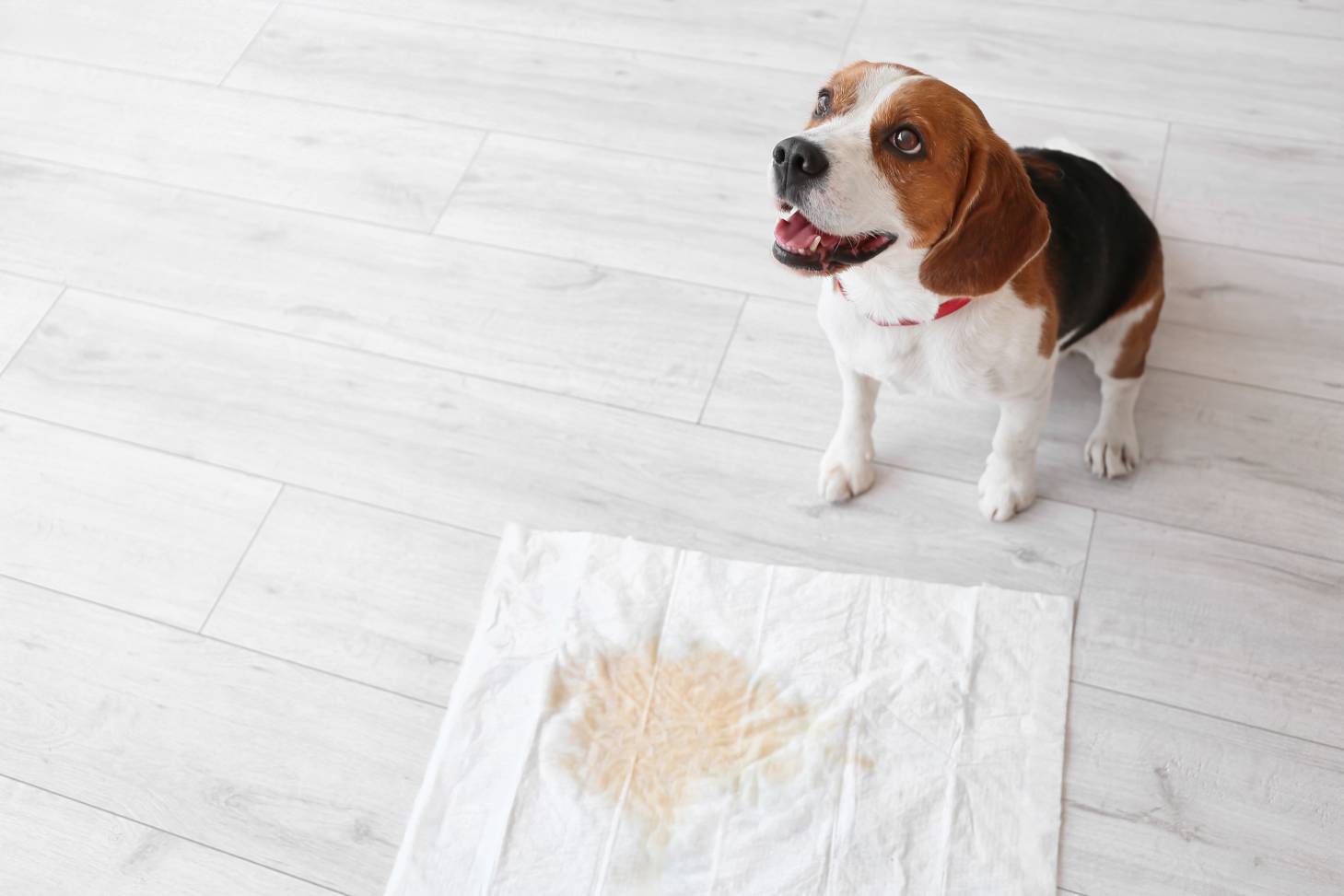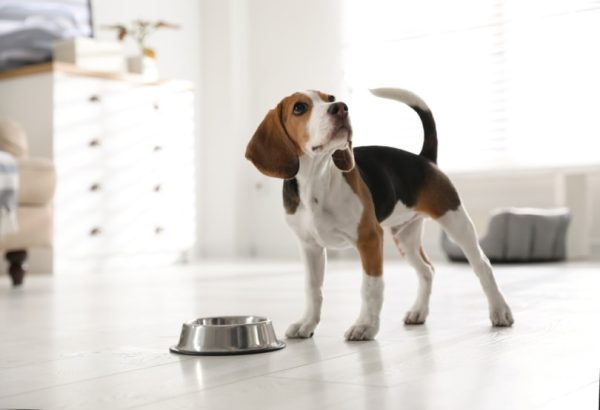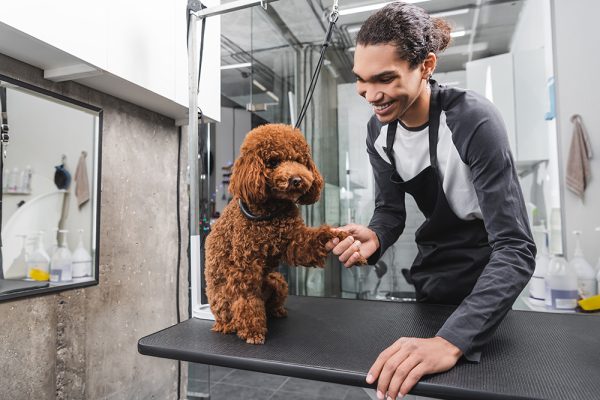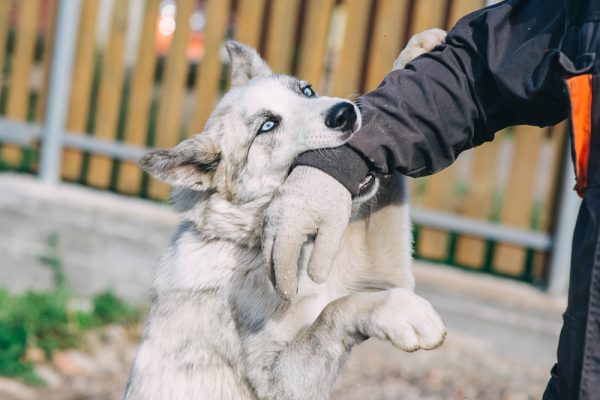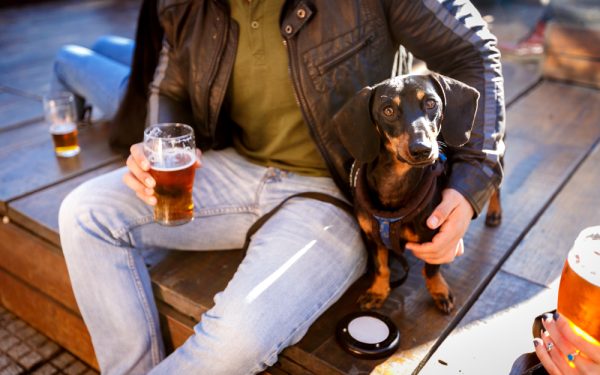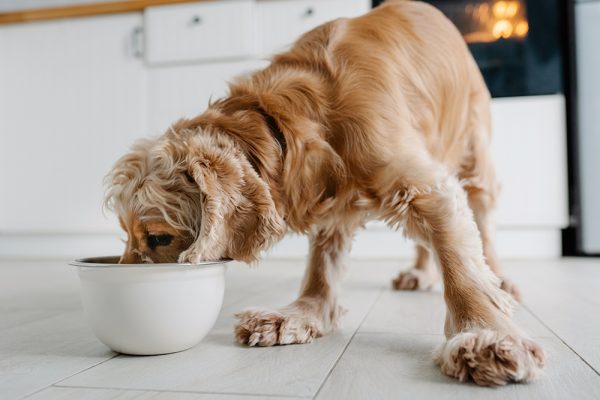As a dog owner, you’ve learned to expect the unexpected. From emergency vet visits to coming home to find your couch destroyed—you’ve probably experienced at least a few doozies.
So, if you realize your dog is leaking urine, you’ll want to find out why. After all, the puppy stage is hard enough during potty training with pee in unexpected places. How do you deal with this new issue when you find a wet patch or that your dog is peeing all the time? The truth is, it depends on the underlying problem that’s causing it, including factors such as your dog’s age and health. Find out more below.
Reasons Why a Dog Might Leak Urine
1. Submissive Urination
Submissive urination is a fearful, or anxious response to outside stimuli. Typically, this happens if the dog is approached, is scolded or hears a deep, loud voice. It is different from excitement urination which is common in puppies. The difference is in the body posture 2.
Signs of submission are flattening of the ears, head and neck down, avoiding eye contact and tucking the tail under. There are a few things that can cause submissive urination.
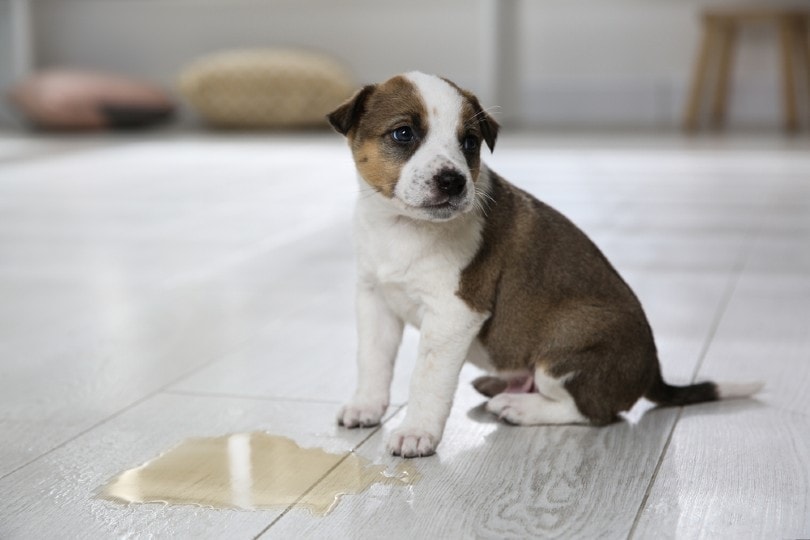
Dog Genetics
If a mother or father was highly submissive or nervous, it can easily trail to the pup, who will exhibit the same traits. Since the root of submissive urination is almost always related to fear this can sometimes be a character trait.
Previous Abuse or Neglect
Submissive urination is especially common in shelter dogs or those who have been previously abused. If your dog has recently been rescued this could be a reason why.
Even if a dog hasn’t been physically abused, it might have a much more fragile spirit than some. Harsh reprimands could have caused anxiety somewhere along the way, causing an element of fear to exist in the relationship.
Dog Anxiety
Submissive urination can be a problem with fear or anxiety. If your dog is anxious, they might be far more prone to submissive urination whenever something happens around them that scares them. This could be loud sounds, a raised hand, or anything else they perceived as a potential threat.
Even if nothing has particularly happened to the dog to cause the behavior, some dogs are simply more sensitive to external noises and chaos than others.
Potential Solutions
Punishing a dog for submissive urination is not a solution and can lead to worsening the behavior in most cases. If, after all health issues have been ruled out, you suspect that submissive urination is the problem, it is essential to handle it supportively.
Rather than dealing out harsh punishments when it happens, it is more important to make your dog feel comfortable in the given situation. At this time, they’re going to need more reassurance than not.
It is an emotional issue which means if you can treat the emotional aspect of the problem, you can decrease the frequency or reverse the problem entirely.
Here are some tips for the Humane Society on how to properly handle submissive urination.
2. Dog Illness or Disease
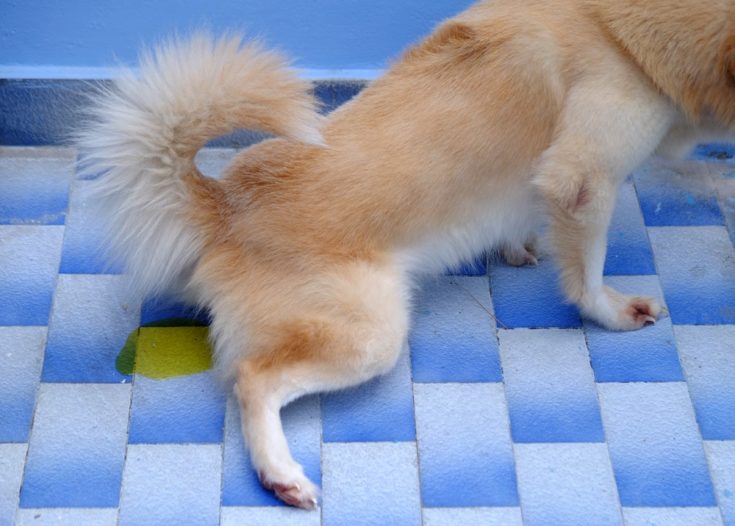
If your dog is suddenly leaking urine, it could be a sign of an underlying medical issue. There are many possibilities, let’s go over the most common in brief detail, along with other accompanying signs.
Usually, if your dog is potty trained and not prone to having frequent, if any, indoor accidents, it could be a UTI. UTIs can develop suddenly and medical treatment is important.
UTI Signs
One of the most obvious signs that a dog has a UTI is urinating much more frequently, often in smaller amounts and having urinary accidents inside the home.
Additional signs of a urinary tract infection include:
- Straining to urinate
- Urinating in small quantities
- Crying or whining during urination
- Blood in the urine
- Excessive genital licking
- Unusually strong odor
UTI Diagnosis
Your veterinarian needs to diagnose a UTI in your dog. Typically, they will give your dog an examination and do a urinalysis. Urinalysis is the testing of urine to see if there are any abnormalities such as blood, bacteria or urine crystals present in the urine. It can be helpful for you to take a urine sample, in a clean container, into your appointment.
UTI Treatment
In most cases, dogs will likely need to take an antibiotic to kill the overgrowth of bad bacteria in the urinary tract; they may also need anti-inflammatories and special diets.
UTI Prognosis
UTIs can clear up pretty quickly with the right treatment and timely care. However, in some cases, it could be a more prolonged treatment course for your pooch.
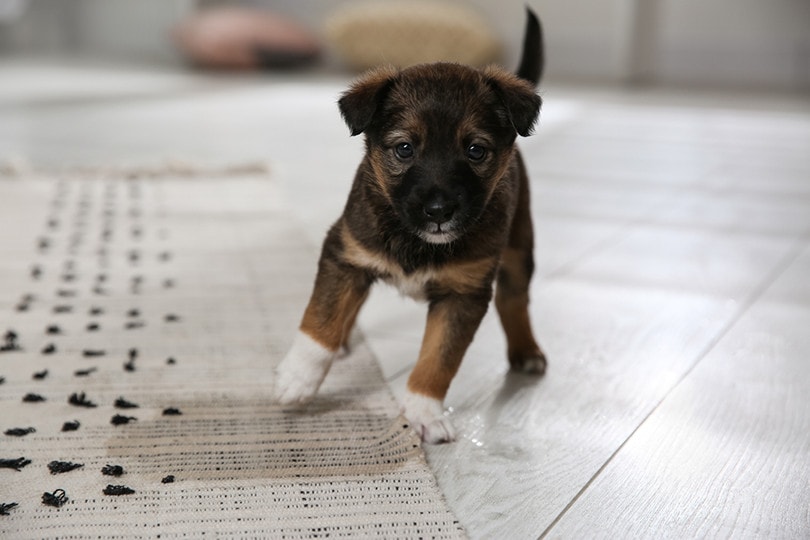
Dog’s can get two types of diabetes: diabetes mellitus or “sugar diabetes” and diabetes insipidus, “water diabetes”. Female dogs can, in rare cases, develop gestational diabetes, needing treatment throughout the pregnancy.
Signs
On top of frequent urination and potential accidents, additional signs include:
- Recurrent urinary tract infections
- Excessive thirst
- Weight loss or gain
- Increased appetite
Diagnosis
Diabetes requires a veterinary diagnosis. If you suspect diabetes, it’s imperative to take your pup in for an appointment.
Treatment
Treatment for diabetes depends on your individual dog and circumstances but will usually require injectable insulin and a controlled diet and exercise regimen. Your vet will check their blood glucose levels and talk things through with you to see what method works best.
Prognosis
Most diabetes requires long-term treatment and monitoring.
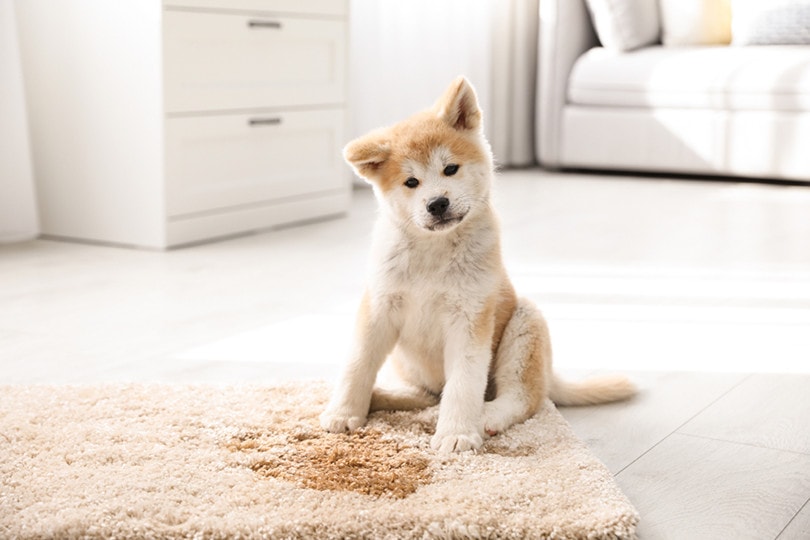
Cushing’s disease is also known as hyperadrenocorticism. In this illness, a dog’s adrenal glands produce much more cortisol than normal.
Diagnosis
A vet needs to diagnose this condition, and they usually do so with bloodwork and urine tests.
Treatment
Often, this disease is managed with medicine but can require surgery.
Prognosis
Though a cure is not possible without complicated surgery, it can be controlled for quite some time in many cases with medication.
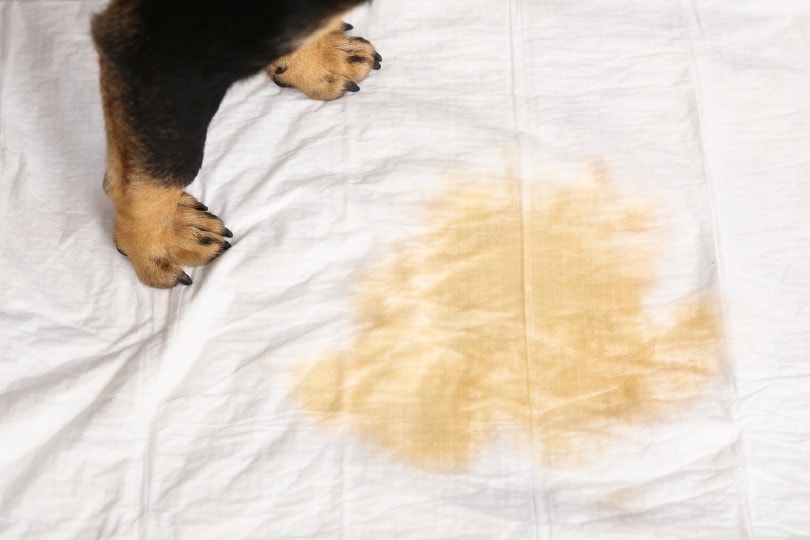
Sometimes, dogs are just born with a developmental problem that directly affects their bladder function. Two of the most common examples of this are abnormalities called ectopic ureters and intrapelvic bladder. But there are several types of possible congenital defects.
Signs
Aside from some leaking urine, other signs to look for include:
- Failure to thrive or develop and gain weight as well as litter mates
- Failure to achieve potty training
- Repeated urinary tract infections
- Difficulty passing urine
Diagnosis
Your vet must be the ultimate judge of whether your dog suffers from one of these defects. A series of bloodwork, urine samples and diagnostic imaging might be needed to gain the necessary details.
Treatment
Treatment for these issues depends on the primary diagnosis and varies from medicine to surgery.
Prognosis
Many dogs who are diagnosed with congenital disabilities can live everyday lives but may need medication, surgery or special care.
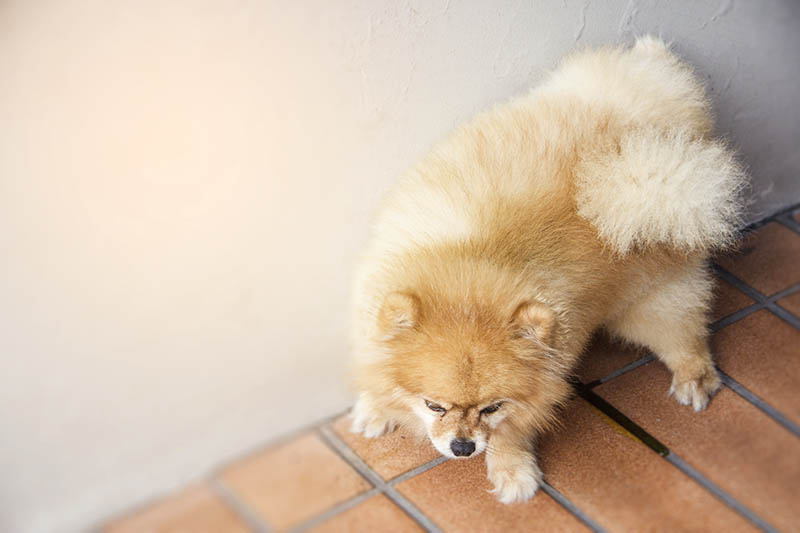
Trauma to the body, especially the abdomen, spine or brain can result in residual issues, such as leaking urine. If your dog had an accident and is leaking urine make sure to discuss this with your vet.
Signs
These would likely be related to the original injury like pain, infections or mobility difficulties.
Diagnosis
Your vet will determine what testing is necessary to assess the injury and give insight on potential solutions. X-rays, ultrasound, endoscopy or exploratory surgery may be needed.
Treatment
Depending on the injury, surgical repair, antibiotics and pain relief may be required.
Prognosis
Your vet will guide you as to the prognosis of your dog’s particular injury and circumstance.
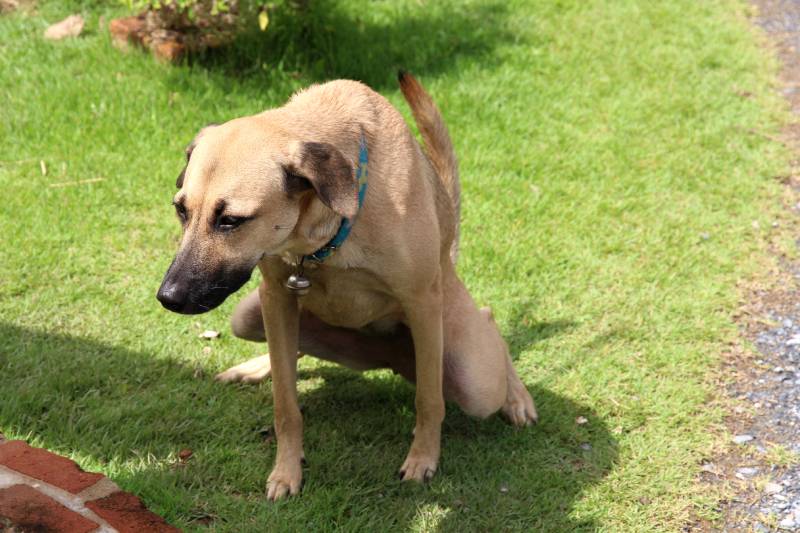
Unfortunately, a common issue among older dogs is kidney disease. It eventually causes noticeable signs, including sometimes leaking of urine.
Signs
Other signs of kidney disease include:
- Decreased appetite
- Increased or excessive thirst
- Increased frequency of urination
- Large urine output volume
- Weight loss
Diagnosis
Your vet will likely perform urinalysis and bloodwork and sometimes ultrasound to determine kidney issues.
Treatment
Since signs of kidney disease usually occur later in the course of the illness, treatment greatly depends on the stage of kidney disease when it is diagnosed. But with early detection, it can be treated with specific prescriptions and diet changes to prolong quality and length of life.
Prognosis
If the disease is manageable, your dog can live several years after diagnosis.
3. Dog Incontinence
As your dog’s body ages, its system starts to weaken over time, decreasing functionality. The bladder is no exception to this. There are many causes of incontinence, which is a failure to voluntarily control urination. Your first port of call should be to the vet if you find that your dog is dribbling urine as they walk or leaving wet patches where they lie when asleep. Incontinence is most common in older dogs and large breed females that have been spayed.
Signs
- Often no other signs except leaking urine
Diagnosis
Your vet will take a thorough history by asking a series of questions and examine your pet. They will then need to run some tests on urine and blood to rule out any other illness.
Treatment
The mainstay of treatment for most dogs with incontinence is medication. Sometimes surgery may be appropriate.
Prognosis
The prognosis is good although life long medication to control the urinary accidents will be needed.
Another option that can help is to install a doggy door if your living situation allows. That way your senior could come in and out as they needed to without relying on you. This can help if they are struggling to hold on for any length of time.
We also recommend finding a good cleaning solution!
If you're looking for an all-in-one, pet-friendly, enzyme cleaner, we highly recommend the Hepper Advanced Bio-Enzyme Pet Stain & Odor Eliminator Spray.
- ADVANCED ENZYMATIC CLEANER - Penetrates the most stubborn smells and stains at the deepest molecular...
- FOR ANY MESS, ON ANY SURFACE - This pet odor eliminator cleans your carpets, floors, furniture,...
- FRESH, NATURAL ODOR - Our unique formulation doesn't rely on dangerous or unpleasant chemical...
It eliminates tough stains and odors easily and is excellent for accident prevention. Plus, it comes with a 100% satisfaction guarantee! Click here to order now.
At Dogster, we’ve admired Hepper for many years, and decided to take a controlling ownership interest so that we could benefit from the outstanding products of this cool pet company!

When to Visit the Vet
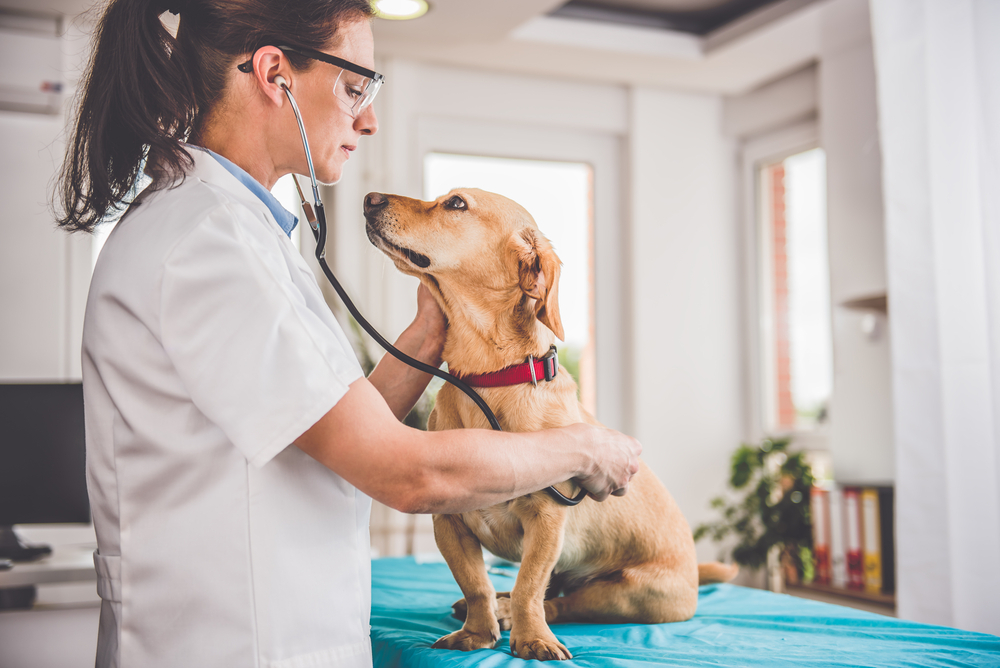
Regardless of the underlying reason, leaking urine is not normal. Anytime you are concerned with the well-being of your dog, or notice unusual signs, it’s time to get them into the vet. It is the quickest way to get answers and solutions for your pup’s problem.
So, regardless of what it is, you can take proactive steps to help accommodate your dog. Together, you and your vet can develop a treatment plan to ensure your pup is completely taken care of.
If you need to speak with a vet but can't get to one, head over to PangoVet. It's our online service where you can talk to a vet online and get the advice you need for your pet — all at an affordable price!

Final Thoughts
So, now you can see that leaking urine and the need to frequently urinate can happen for various reasons. Sometimes, it can be very easy to pinpoint an underlying cause. Other times, it might require a more detailed diagnostic work up. In the majority of cases treatment will enable an improvement in the situation for both you and your dog.
Featured Image Credit: Pixel-Shot, Shutterstock
